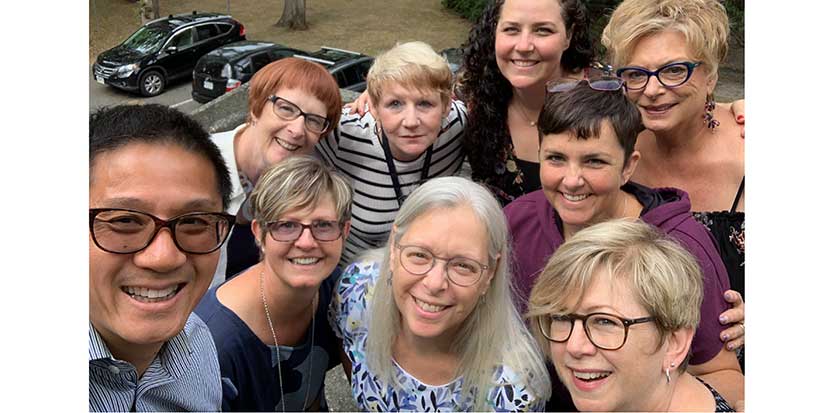Latest News
Richmond students need you!
—
The Richmond School District has dealt with the province-wide shortage of education assistants with a can-do attitude: by creating their own training program.
Called REAP (Richmond Educational Assistant Program), the deadline to apply for placement in the 2020 term has been extended to Oct. 11.
EAs, as they are commonly known, work one-on-one with students who have need of their own support worker in the schools be it for emotional, physical or social reasons. They work teachers’ hours ,which means it is well-suited to adults who need to be home after school to take care of their own children. And the pay is decent and comes with school district employee benefits.
The training is offered in two ways: a part-time program is spread over 13 months, with classes on Monday, Wednesday nights and Saturdays; or as a four-month full-time program that runs Mondays to Fridays from 8:30 a.m. to 3 p.m. from July to the end of November.
A program of our school district’s continuing education department, REAP is only a few years old but is already popular with employers. While some of the graduates find work with other school districts, but the majority of grads still choose to work here in Richmond, says Kathleen Champion, one of the two program directors.
Since REAP training began, 150 people have graduated with 120 walking into jobs in the Richmond School District and the others being snapped up by private schools or by other public school districts. And, according to Champion, our school district still needs even more EAs.
Designed and run by Champion and Christine Brodie, who have known each other since teaching together in the early 1980s, REAP offers a reasonably fast route to a job with good pay and good hours that work well for people who want to finish their work day at 3 p.m. because of other responsibilities.
“We have had over our short career since 2016 many people apply and be accepted into program who were teachers in other countries, also doctors in other countries. We have had some with PhDs in various related fields in other countries, all of whom have applied and been accepted,” says Champion.
But she is clear that you don’t need an advanced university degree or, in fact, any degree at all to make a good EA.
Some of the applicants are people returning to work who have been out of the work force to take care of their children, a sick family member, or an elder.
Champion says, “Hundreds of those women have never heard of such a role as an educational assistant. Unless they had kids in a school where they met an EA, they would never have considered it.”
The first step in the process, Champion says, is applying by going to the school district’s website and filling in the REAP forms. She is clear that they are willing to answer any questions you may have.
After you apply, those who make the short list are interviewed to see if it really is a job they want to do.
“It’s a several stage process. Being an EA is a difficult job and we want to make sure people are well-informed about the role they are getting into and are passionate about it and really want to do it,” says Champion
She says about half of the people who apply are accepted into the program so your odds are good.
The head of the school district’s continuing education, Michael Khoo, says REAP teaches future EAs how to support individual students who require adaptations and accommodations to succeed in the Richmond Public School System.
“And guess what?” Champion says, “These things you learn are good for the whole class.”
Champion says some working teachers say they wish they had been able to learn the REAP program’s strategies, knowledge and skills because classrooms today are so diverse.
Khoo says some parents and applicants to the program say they wished they had had EAs when, and where, they went to school, saying, “We want to be part of the support system that does better.”
The REAP study program offers two options, full-time study and part-time.
It’s the part-time program that starts the soonest, Khoo says, with study beginning at the end of January 2020 and running through February of 2021, with breaks that follow the school season for winter, spring and summer holidays.
The part-time program was designed for people who might work Monday to Friday or who might have child care needs during the day. On the other hand, the full-time program means people get through it, graduate and join the workforce sooner.
Champion warns even though it is a part-time study program, there will be four June practicum sessions during school hours that participants must attend. It gives the future EAs a chance to try out their skills with real students as well as allows Champion and Brodie the opportunity to assess each REAP participant in action.
“So if you’re working, you have to be sure your employer will accommodate that,” cautions Champion.
REAP is an educational program that leads to a job that Champion, well, champion.
“(EAs) do amazing things with the kids; they augment what our teachers do. It’s a great collaboration between what our teachers do. They bring their skills and talents together. It’s so fantastic.”
Khoo says of successful applicants, “Some have used the phrase, ‘This is something that fits who I am. It’s a career calling. I was meant to do this.’ “
Learn more about becoming an educational assistant by emailing RCE@sd38.bc.ca or calling Richmond Continuing Education at 604-668-6123.






























